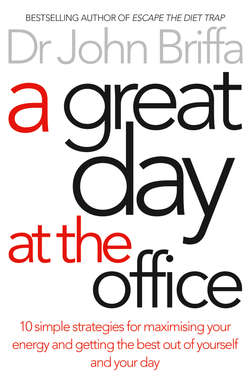Читать книгу A Great Day at the Office: 10 Simple Strategies for Maximizing Your Energy and Getting the Best Out of Yourself and Your Day - Dr. Briffa John - Страница 39
The Question of Cholesterol
ОглавлениеBefore we leave the subject of saturated fat, there’s just one more attribute of this foodstuff that demands our attention: the idea that it raises blood cholesterol levels. The thinking here is that higher cholesterol levels cause heart disease, so if saturated fat raises cholesterol, it must cause heart disease.
Actually, the bulk of the evidence does not find a strong relationship between saturated fat levels in the diet and cholesterol levels in the bloodstream at all. One recent review of the literature concluded that: ‘The influence of dietary fats on serum cholesterol has been overstated.’33
And even if eating saturated fat does raise cholesterol levels, it’s irrelevant anyway. This is because the impact anything (e.g. a food or drug) has on cholesterol levels is not the important thing – it’s the impact it has on health that really matters. With regard to this, here are the facts:
Eating more saturated fat is not linked with an increased risk of heart disease (some evidence suggests that it’s quite the reverse, actually)
Eating less saturated fat and/or replacing it with ‘healthier’ fats has not been found to have benefits for health
Any data that exists regarding the impact of saturated fat and cholesterol levels is now completely redundant.
These facts, rooted in research and not rhetoric, will not stop food companies marketing cholesterol-reducing foods with the promise that they are good for the heart (see section ‘Spreading the Risk’ below). The idea that eating in a way that reduces cholesterol will cause our heart disease risk to come tumbling down is actually based on studies in which cholesterol-modifying medications have been found to reduce the risk of heart disease. However that’s quite a leap of faith, because the mechanisms of a drug’s action are, generally, entirely different to those induced by dietary change, and the benefits may not transfer at all.
Also, while cholesterol reduction with certain medications has been found to reduce the risk of cardiovascular disease, a more important measure of benefit is their impact on overall risk of death. That’s because, while a medication may reduce the risk of one condition, it may increase the risk of others (low cholesterol is associated with an increased risk of cancer, for instance) and possibly have side effects that pose hazards for health. So, just how effective are cholesterol-reducing agents at saving lives?
